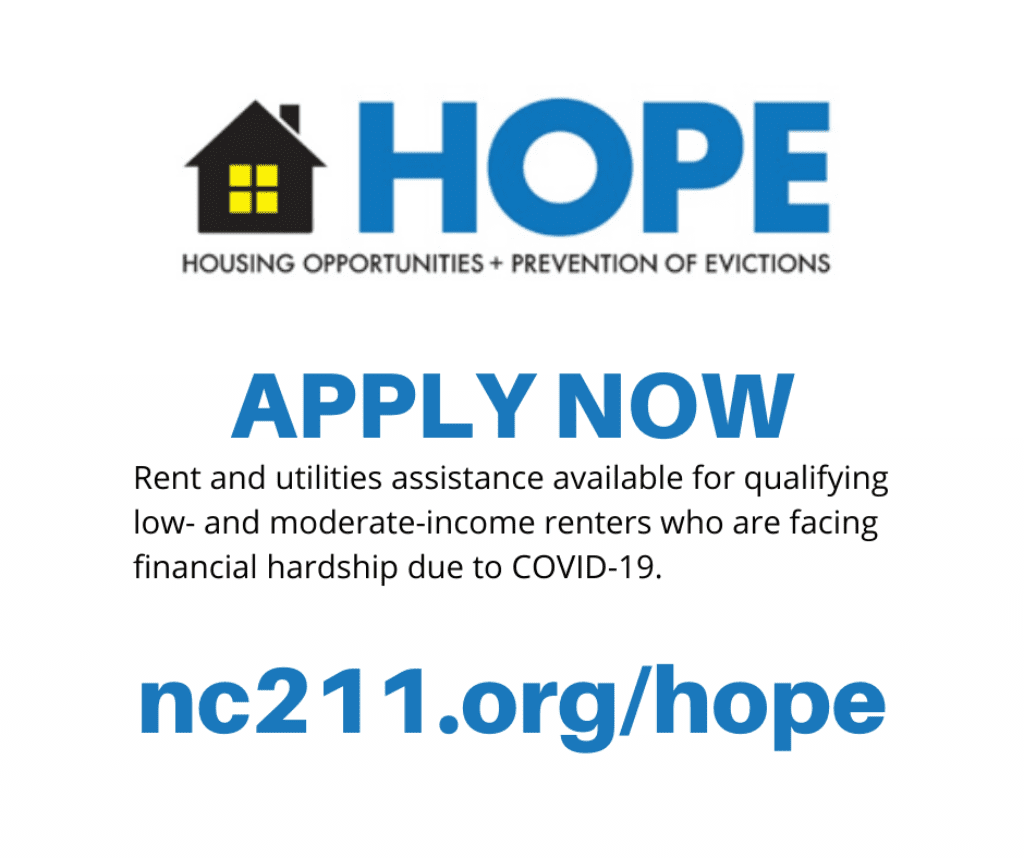
Thursday, October 15th Governor Roy Cooper announced the opening of the state’s program to provide emergency rental and utility assistance to low- and moderate-income households facing housing instability due to the COVID-19 pandemic. The program, Housing Opportunities & Preventing Evictions (HOPE), announced by Gov. Cooper in August and administered by the NC Office of Recovery & Resiliency (NCORR), utilizes $117 million in federal CARES Act resources to assist households struggling with past due rent and utility payments. The 211 system serves as the network to conduct intake, screen applicant eligibility, and connect individuals to the appropriate financial assistance. Individuals in need of assistance are urged to apply immediately via the online application or by dialing 2-1-1 on a phone.
Since the program opened at 3 PM on Thursday, over 11,000 people have applied for assistance, with over 9,100 being eligible for assistance (as of the morning of Tuesday 10/20). Of the nearly 2,000 people deemed ineligible, many are homeowners who, unfortunately, are excluded from receiving assistance under the HOPE program. There are currently no statewide resources to assist homeowners struggling to stay current on their mortgages.
The program will remain open to applicants until December 30th or once funds are exhausted. At the current pace of applications, NCORR officials expect to have allotted all current funds well before that date. Again, anyone who needs assistance should apply now to ensure resources are available.
Eligibility & Covered Expenses
Other than being renters, North Carolinians must meet the following criteria to be eligible:
- Have been affected by the economic impact of the coronavirus pandemic,
- Have a household income that is 80% of the area median income (AMI) or lower,
- Occupy the rental property as their primary home, and
- Are behind on their rent or utilities when they apply.
Applicants must self-certify that they meet these criteria and also provide the landlord’s contact information and/or relevant utility account information. Payments are made on behalf of the renter directly to the landlord or utility company. In order to receive payments the landlord must agree to the following conditions for the remainder of the lease:
- Agree not to evict the tenant and end eviction proceedings for non-payment
- Agree not to increase the rent
- Agree to maintain a fit and habitable dwelling for the renter
- Agree not to impose new service fees, charges, penalties, or legal fees, and
- Agree to adhere to other conditions in the Landlord/Tenant Agreement.
Funds can be used to cover six months of rent, including past due and future rent. To be eligible for rental assistance, the tenant must be at least one month behind. For utility assistance, HOPE covers only past due payments up to six months for “essential” utility services, such as electricity, water/sewer, natural gas, or propane. If the tenant anticipates their financial situation will not be improving in the next couple months, they can also apply to have future rent covered (as long as they are within the total six months allowed) in order to avoid housing loss. Keeping as many people as possible within their housing is the main intent in establishing the HOPE program and paying future rent helps people remain housed.
Implementation of Funds
The HOPE program is funded by federal resources that the state has received through the CARES Act, which was enacted in late March. Of the $117 million in funds, $66 million is coming from the Coronavirus Relief Fund and $51 million is from CDBG-CV funds to the state (see our previous blog for more details on CDBG-CV).
Renters in all parts of the state are eligible regardless of jurisdiction. NCORR is tracking and coordinating with localities to avoid duplication of benefits and ensure resources are used efficiently. Those in need are encouraged to simply call 211 or visit the website. Case managers will determine eligibility and connect renters to local community partners to complete paperwork and coordinate payment disbursement. 211 case managers can also connect individuals to other non-housing resources they may also need, such as food assistance, healthcare, and support groups.
The On-Going Need for Assistance
While the HOPE program will surely assist tens of thousands of North Carolinians, we know that all needs will not be met. Already as NCORR has reported on our weekly Housing Call, there are thousands of homeowners also in need of financial assistance but are ineligible for the HOPE program. More than half of the renters who have applied thus far are requesting resources to help with both rent and utilities.
Approximately 700,000 North Carolinians are estimated to be at-risk for eviction. Nationally over 30 million people may be facing eviction. With a COVID-19 vaccine or cure unlikely until well into 2021, the economic and health impacts will continue to be felt. Existing racial and income disparities around housing security and financial resources will only become even more entrenched if the government fails to meet the needs to ensure people are able to stay housed. Additional relief, particularly housing resources, are desperately needed.
At the national level, Congress and the White House continue negotiations on another relief package. As of this writing, House Democrats have proposed a $2.2 trillion package, while the White House has offered a $1.88 trillion package. However, with the November 3rd election less than two weeks away, it remains increasingly unlikely that additional relief will be enacted in the near term. (Please visit this week’s Policy Update for more details.) Depending on the outcome of the Presidential and Congressional races, national advocates predict that even during the lame duck session additional relief may not be politically feasible. It is possible that additional resources will not be available until late January 2021.








